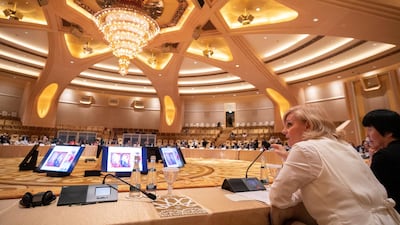A senior WHO official said she cannot comprehend the lack of outrage over the seven million premature deaths every year that are caused by air pollution.
Speaking on Monday, the director of public health and environment at the World Health Organisation, said it was a mystery why more people were not demanding immediate action to tackle the world’s invisible killer.
The links between air pollution and illness are well documented and Maria Neira warned it was one of the biggest public health challenges the world faced.
"This is about asthma, lung cancer, stroke and heart disease," she told The National at the Abu Dhabi Climate Meeting. "People are breathing what is available — and what is available is not safe."
Most of the deaths occur in Africa and Asia and Ms Neira said it was inexplicable that more people were not talking about the issue.
“I ask myself this question every day,” she said. “How can it be possible that we have seven million premature deaths a year and we don’t see people panicking or jumping on governments asking what are you doing to protect me.”
She said air pollution caused more deaths than HIV/Aids, malaria, TB and even malnutrition combined, and while interest was growing much more needed to be done to tackle the problem. Combating climate change was the primary way to end these unnecessary deaths.
“Two thirds of air pollution is caused by the combustion of fossil fuels so this is the same source of climate change,” she said.
Ms Neira’s comments came on the second and final day of the climate meeting which was largely dedicated to health. Dr Thani Al Zeyoudi, UAE Minister for Climate Change and the Environment, added to the calls. “It originally was about the planet and animals. That is valid but undersold a powerful political narrative — people’s health,” he said.
“The medical bills from climate change are staggering, the humanitarian bills are staggering, and the number of deaths is unacceptable," Dr Al Zeyoudi said.
"But I want to take a more positive and balanced outlook here: Not just that climate change kills, but that climate action saves lives. Not just that health impacts are expensive, but that climate action is worth investing in.”
Cities in the Middle East are hugely affected by air pollution because of rapid development and use of fossil fuels. Dust storms compound the problem. Reports by the Environment Agency Abu Dhabi have suggested that air pollution is a major factor behind respiratory and cardiovascular diseases in the UAE. But the country has been ramping up efforts to improve air quality.
Authorities in 2018 established an air-quality monitoring station at the Ministry of Climate Change and Environment. The new station complements those used by the National Centre of Meteorology and follows the Environment Agency Abu Dhabi's endorsement of the Plume smartphone app, which helps residents monitor air quality. Dr Al Zeyoudi has said that by 2021 the UAE wants to improve its air quality by 90 per cent on current levels.
Ms Neira, meanwhile, stressed that the way to tackle the issue was by switching to renewable energy and she lauded the UAE — one of the world's largest fossil fuel producers — for its burgeoning commitment to solar power.
"The equation has to change," she said. "The UAE has been extremely supportive and we have no reasons to think that they are not committed."


